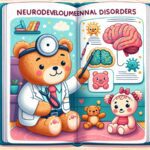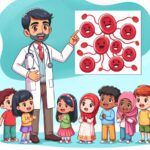Genetic disorders in babies are a significant concern for many new parents, touching the lives of countless families around the world. These conditions, passed down through generations, can affect a baby’s health, development, and overall well-being. This comprehensive guide aims to explore the complex world of genetic disorders, providing valuable insights into their symptoms, diagnosis, and management. Whether you’re a new parent or expecting, understanding these conditions can empower you to seek the best care for your child.
What Are Genetic Disorders?
Genetic disorders arise due to mutations in an individual’s DNA. These mutations can be inherited from parents or occur spontaneously. They affect various aspects of health, from physical traits to susceptibility to certain diseases. There are hundreds of known genetic disorders, ranging from the relatively mild to those that require intensive, lifelong management.
Examples include Down syndrome, cystic fibrosis, and sickle cell disease, each presenting unique challenges to affected individuals and their families. Understanding these conditions is the first step toward effective management and support.
How Are Genetic Disorders Diagnosed?
Diagnosing genetic disorders often involves a combination of family medical history analysis, physical examinations, and genetic testing. Prenatal testing, such as amniocentesis and chorionic villus sampling, can identify genetic disorders before a baby is born. After birth, newborn screening tests check for certain conditions that can affect a baby’s long-term health.
For more detailed information on genetic testing and disorders, visiting credible sources like the National Human Genome Research Institute can provide in-depth insights and support.
Managing Genetic Disorders in Babies
Management of genetic disorders varies widely depending on the specific condition. Some disorders may require lifestyle adjustments and dietary changes, while others necessitate medication, surgery, or other treatments. Early intervention and specialized care can significantly improve quality of life and outcomes for many children.
Support services and resources, such as genetic counseling, can be invaluable for families navigating the challenges of a genetic disorder. Counselors provide information, support, and guidance on managing conditions and making informed decisions about care and treatment options.
Genetic Disorders: Common Questions and Concerns
Many parents have questions and concerns when it comes to genetic disorders. ‘What is the likelihood my child will inherit a condition?’ ‘How can I support my child’s development and well-being?’ These are valid concerns, and obtaining accurate information is crucial.
Consulting with healthcare professionals, including pediatricians and genetic specialists, can provide personalized advice and reassurance. Additionally, connecting with support groups and networks of other families facing similar challenges can offer emotional support and practical advice.
Resources and Support for Families
For families affected by genetic disorders, a wide range of resources is available to provide support and information. Organizations such as the Genetic Disorders Hub on BabyWhysAndHows.com offer articles, guides, and links to further resources. Additionally, websites such as the National Organization for Rare Disorders (NORD) provide comprehensive databases of conditions, treatment options, and support networks.
It’s important for families to know they’re not alone. Community support, along with professional medical care, can make a significant difference in navigating the complexities of genetic disorders.
Conclusion
Understanding genetic disorders in babies is a crucial step for new parents, offering the knowledge needed to seek proper care and support for their child. While the journey may be challenging, advancements in medicine and genetics offer hope for effective management and treatment. By utilizing available resources and support networks, families can navigate these challenges with confidence and provide their children with the best possible quality of life.













